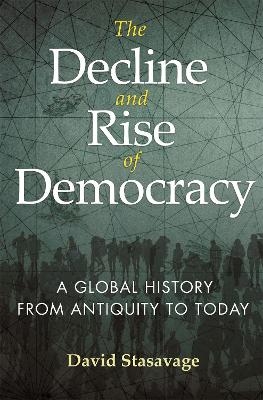
The Decline and Rise of Democracy
A Global History from Antiquity to Today
Seiten
2020
Princeton University Press (Verlag)
978-0-691-17746-5 (ISBN)
Princeton University Press (Verlag)
978-0-691-17746-5 (ISBN)
"One of the most important books on political regimes written in a generation."—Steven Levitsky, New York Times–bestselling author of How Democracies Die
A new understanding of how and why early democracy took hold, how modern democracy evolved, and what this history teaches us about the future
Historical accounts of democracy’s rise tend to focus on ancient Greece and pre-Renaissance Europe. The Decline and Rise of Democracy draws from global evidence to show that the story is much richer—democratic practices were present in many places, at many other times, from the Americas before European conquest, to ancient Mesopotamia, to precolonial Africa. Delving into the prevalence of early democracy throughout the world, David Stasavage makes the case that understanding how and where these democracies flourished—and when and why they declined—can provide crucial information not just about the history of governance, but also about the ways modern democracies work and where they could manifest in the future.
Drawing from examples spanning several millennia, Stasavage first considers why states developed either democratic or autocratic styles of governance and argues that early democracy tended to develop in small places with a weak state and, counterintuitively, simple technologies. When central state institutions (such as a tax bureaucracy) were absent—as in medieval Europe—rulers needed consent from their populace to govern. When central institutions were strong—as in China or the Middle East—consent was less necessary and autocracy more likely. He then explores the transition from early to modern democracy, which first took shape in England and then the United States, illustrating that modern democracy arose as an effort to combine popular control with a strong state over a large territory. Democracy has been an experiment that has unfolded over time and across the world—and its transformation is ongoing.
Amidst rising democratic anxieties, The Decline and Rise of Democracy widens the historical lens on the growth of political institutions and offers surprising lessons for all who care about governance.
A new understanding of how and why early democracy took hold, how modern democracy evolved, and what this history teaches us about the future
Historical accounts of democracy’s rise tend to focus on ancient Greece and pre-Renaissance Europe. The Decline and Rise of Democracy draws from global evidence to show that the story is much richer—democratic practices were present in many places, at many other times, from the Americas before European conquest, to ancient Mesopotamia, to precolonial Africa. Delving into the prevalence of early democracy throughout the world, David Stasavage makes the case that understanding how and where these democracies flourished—and when and why they declined—can provide crucial information not just about the history of governance, but also about the ways modern democracies work and where they could manifest in the future.
Drawing from examples spanning several millennia, Stasavage first considers why states developed either democratic or autocratic styles of governance and argues that early democracy tended to develop in small places with a weak state and, counterintuitively, simple technologies. When central state institutions (such as a tax bureaucracy) were absent—as in medieval Europe—rulers needed consent from their populace to govern. When central institutions were strong—as in China or the Middle East—consent was less necessary and autocracy more likely. He then explores the transition from early to modern democracy, which first took shape in England and then the United States, illustrating that modern democracy arose as an effort to combine popular control with a strong state over a large territory. Democracy has been an experiment that has unfolded over time and across the world—and its transformation is ongoing.
Amidst rising democratic anxieties, The Decline and Rise of Democracy widens the historical lens on the growth of political institutions and offers surprising lessons for all who care about governance.
David Stasavage is dean for the social sciences and Julius Silver Professor of Politics at New York University. His books include Taxing the Rich and States of Credit (both Princeton). Twitter @stasavage
| Erscheinungsdatum | 04.06.2020 |
|---|---|
| Reihe/Serie | The Princeton Economic History of the Western World |
| Zusatzinfo | 32 b/w illus. |
| Verlagsort | New Jersey |
| Sprache | englisch |
| Maße | 155 x 235 mm |
| Themenwelt | Geisteswissenschaften ► Geschichte ► Allgemeine Geschichte |
| Sozialwissenschaften ► Politik / Verwaltung ► Politische Systeme | |
| Sozialwissenschaften ► Politik / Verwaltung ► Politische Theorie | |
| ISBN-10 | 0-691-17746-5 / 0691177465 |
| ISBN-13 | 978-0-691-17746-5 / 9780691177465 |
| Zustand | Neuware |
| Informationen gemäß Produktsicherheitsverordnung (GPSR) | |
| Haben Sie eine Frage zum Produkt? |
Mehr entdecken
aus dem Bereich
aus dem Bereich
eine Familiengeschichte der Menschheit
Buch | Hardcover (2023)
Klett-Cotta (Verlag)
CHF 68,60
Eine wahre Geschichte von Schiffbruch, Mord und Meuterei
Buch | Hardcover (2024)
C.Bertelsmann (Verlag)
CHF 34,95


